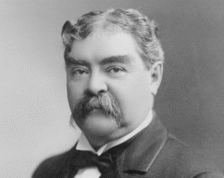
Detroit Mayor Dennis Archer's announcement that he would not seek re-election surprised many who expected him to run for a third term as chief executive of Michigan's largest city. Among the mayor's greatest accomplishments is the civil tone he set while in office, which has helped bridge the gap of mistrust that had sprung up between Detroit residents and their suburban counterparts.
But as the Motor City enters its fourth century, it needs more than a civil tone to fuel its long overdue economic renaissance. At the turn of the previous century, another Democratic mayor known for his genteel manner did in fact do more to help bring greater opportunities and prosperity to the citizens of Detroit. He was William C. Maybury, a former congressman and city attorney who served as mayor from 1897-1904.
The Detroit Free Press, in its recently published "Detroit Almanac," describes Maybury as a "conservative, pro-business" mayor, though in truth he defies easy ideological labels. While he supported municipal ownership of all utilities including gas, water, lighting, and public transit—believing the city could provide these things at lower cost—he did indeed understand that high taxes were an impediment to job creation and economic growth.
Surveying what he saw as Detroit's substandard business climate in 1898, Maybury said in his first annual address to the city council, "Lower taxation is the keynote to the present situation. Let us be able to offer to industrial enterprises the lowest rate of taxation consistent with good government, with favorable contrast with other cities."
Over the next year, Maybury oversaw a cut of nearly 10 percent in Detroit's tax burden while he worked, with positive results, to attract more jobs and businesses to the city. In his second annual address, he was able to say, "Our city is now in closer touch with the most favored cities of the Union in the rate of taxation, and therefore becoming more attractive to the investor and manufacturer."
The mayor made every effort to ensure that Detroit's taxes remained as low as possible. He kept a sharp eye on expenses and required all departments to seek competitive bids for any supplies over $200. In 1899, he analyzed expenses for street cleaning and found the city to be spending more than necessary to get the job done. "We all demand and want clean streets and alleys," he said, "but no taxpayer desires to pay any more than it is worth to keep them clean."
Maybury encouraged Detroit's economic growth in other ways. In 1897, when he heard of the financial difficulties of a young inventor named Henry Ford, he personally helped Ford pay the bills and lined up investors for Ford's first company. Maybury later remarked to city officials that "the fast developing automobile . . . is bound to be a feature of the century on which we are about to enter" and predicted that "it will extend and revolutionize the existing modes of transit in cities . . . ." Ford's venture, the Detroit Automobile Company, fell apart in 1900, but Maybury's early encouragement was key to helping Ford get his start in the industry that would create hundreds of thousands of jobs for Detroiters and become synonymous with the city itself.
By 1902, Maybury reported that "The financial condition of the city . . . is gratifying in every way . . . ." He told the council, "Despite the growth of our city in population, and with increased demands for improvements, the rate of taxation has increased but slightly, while improvements have been wisely and economically made."
In spite of his popularity and the city's growing prosperity (Henry Ford was now selling thousands of cars each year), Maybury lost his bid for re-election in the 1904 Republican sweep of Michigan. He had served for three-and-a-half two-year terms, longer than any previous Detroit mayor. When he died in 1908, local citizens took up a collection to build a bronze statue of him, which still stands downtown in Grand Circus Park.
Maybury's record in office provides a great lesson for the next mayor of Detroit, whoever he or she may be. The Motor City must trim its bloated and wasteful budget and find ways to lower an onerous tax burden that is several times higher than the average burden in Michigan municipalities. Only then can the renaissance begin.

The Mackinac Center for Public Policy is a nonprofit research and educational institute that advances the principles of free markets and limited government. Through our research and education programs, we challenge government overreach and advocate for a free-market approach to public policy that frees people to realize their potential and dreams.
Please consider contributing to our work to advance a freer and more prosperous state.